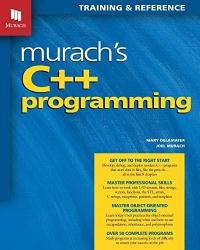Murach's C++ Programming
- Добавил: literator
- Дата: 1-12-2022, 06:28
- Комментариев: 0
 Название: Murach's C++ Programming
Название: Murach's C++ Programming Автор: Mary Delamater, Joel Murach
Издательство: Mike Murach & Associates
Год: 2018
Страниц: 802
Язык: английский
Формат: pdf
Размер: 105.9 MB
C++ was first released in 1985, and it was a hard language to learn. That's because it required programmers to master low-level techniques to work with memory. Over the years, C++ has evolved to provide many higher-level techniques that make it much easier to write effective C++17 code. But most C++ books haven't evolved with the language.
Now, Murach's top authors have tackled the subject, rethinking the whole approach. So this book takes advantage of the modern techniques to make it easier to learn C++ than ever before. It's organized in a logical way that gets you off to a fast start with a practical subset of today's C++, and then builds out your coding and OOP skills to the professional level. With that foundation in place, it also covers older techniques so you'll be able to maintain the vast amount of legacy code that's out there, as well as work with embedded systems that don't support the newer techniques.
To make all that manageable, this book uses Murach's distinctive paired-pages format that programmers find so helpful for both training and reference: Each topic is presented in a 2-page spread, with syntax, coding examples, and bulleted guidelines on the righthand page and extra explanation and perspective on the left.
What's more, this book gives you 50+ realistic program examples to study, as well as practice exercises for hands-on experience. Examples and exercises like these are the key to learning any programming language. But you'll have a hard time finding such effective ones in other books and courses, that deliver the skills ours do.
To make your C++ training as effective as possible, this book is divided into four sections:
- Section 1 presents a practical subset of modern C++ that gets you off to a great start. This section works for both beginners and experienced programmers because it lets you set your own pace. If you’re a beginner, you’ll move slowly and do all the exercises. If you have experience, you’ll move more quickly, skimming through material you already know to focus on skills that are new to you or that you’ve never mastered.
- Section 2 builds on the subset to present additional C++ essentials that programmers use every day. These skills include working with structures, enumerations. Standard Template Library (STL) containers and algorithms, built-in arrays, C strings, and exceptions.
- Section 3 shows you how to develop object-oriented programs in C++. This is a critical skillset in today’s world, and it complements the procedural skills you learned in section 1. When you complete this section, you’ll be able to develop programs that combine the best procedural practices with the best object-oriented practices.
- Section 4 presents some advanced skills that you may need, especially if you’re working with legacy code or embedded systems. These skills include using pointers to work with memory at a low level and using templates to allow a class to support multiple data types. By the end of this section, you’ll also have learned how to develop custom containers and algorithms that work like the containers and algorithms of the STL presented in section 2.
Скачать Murach's C++ Programming
Внимание
Уважаемый посетитель, Вы зашли на сайт как незарегистрированный пользователь.
Мы рекомендуем Вам зарегистрироваться либо войти на сайт под своим именем.
Уважаемый посетитель, Вы зашли на сайт как незарегистрированный пользователь.
Мы рекомендуем Вам зарегистрироваться либо войти на сайт под своим именем.
Информация
Посетители, находящиеся в группе Гости, не могут оставлять комментарии к данной публикации.
Посетители, находящиеся в группе Гости, не могут оставлять комментарии к данной публикации.
